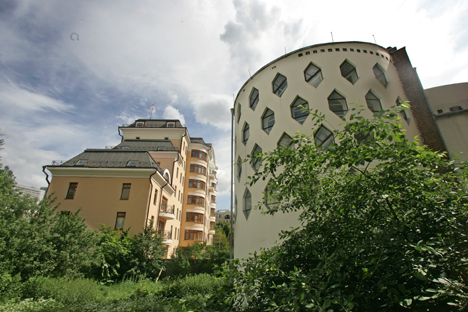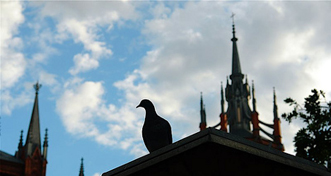Muscovites petition to save architectural monument

Melnikov's house (R) could be damaged because of building an underground parking close to monument. Source: ITAR-TASS
A masterpiece of avant-garde Russian architecture – the house of architect Konstantin Melnikov – is on the verge of ruin.
Those who are looking to preserve the monument, including leading cultural heritage organizations, claim that the building is being damaged by the construction of a multi-purpose center with an underground parking garage opposite the monument.
The scandal erupted in the summer of 2012, when the historic Migunov House was demolished in order to make way for the multi-purpose commercial and entertainment center on Arbat Street in the historical center of the city.
Related:
Discovering Gothic Moscow: A tour of architectural masterpieces
Moscow's oldest railway station receives a facelift
Seven Sisters, emblems of Soviet grandeur, light up Moscow skyline
The 18th century building had survived the French invasion of Russia and the ensuing Moscow Fire of 1812. Many violations were recorded when it was demolished; the contractor did not have the proper authorization and was subsequently fined 600,000 rubles ($20,000).
Furthermore, many of the adjacent buildings were damaged as a result of the demolition, and cracks began to appear. Melnikov House was one of these buildings.
After that, people started making noise, saying the construction of the commercial and entertainment center may seriously affect the surrounding historic buildings.
Excavation work started on the site of the demolished building in February 2013. Although the ground was frozen (which is considered safer for surrounding buildings), new cracks appeared on Melnikov House, and plaster started to crumble.
It was at this point that people started a campaign against the developer Trust-Oil to save the building.
Reputable international organizations, such as the International Council on Monuments and Sites (ICOMOS), the International Working Party for Documentation and Conservation of Buildings (Docomomo) and the International Union of Architects (IUA) joined the campaign.
They addressed President Vladimir Putin, Prime Minister Dmitry Medvedev and Moscow Mayor Sergey Sobyanin with a request to halt the construction and brace the frame and foundation of the monument.
ICOMOS even issued a Heritage Alert and plans to include Melnikov House in the Heritage at Risk list. This is the first time such a high level of alert has been issued for a Russian monument.
The multi-purpose center is being built by construction company Trust-Oil, which has cited building regulations allowing the developer to go 26 feet below the surface, given the distance between the site and Melnikov House.
Furthermore, Trust-Oil commissioned a study from the Gersevanov Research Institute of Foundations and Underground Structures that said the impact of the construction was within 46 feet of the site, whereas Melnikov House is 105 feet away from the construction pit.
The study concluded that the shrinkage cracks on the outer walls and foundation of the monument and crumbling plaster appeared because repairs were long overdue.
“The Gersevanov Institute has a very bad reputation,” says Natalya Samover, coordinator at Archnadzor organization.
“They are famous for providing the conclusions that their customers want. Besides, Trust-Oil talks about the results of a study, but never shows any documents. In any case, the report is not good enough to be used in this dispute, because it was commissioned by a party involved. An independent study is required. As far as I know, the Russian Academy of Architecture and Construction Sciences is putting together an independent team to carry out the same study, and it won’t be paid for by any of the parties.”
“The house was built in 1929, when population density was not high in Moscow,” Samover says. “But during the last few years, the landscape of Arbat and the adjacent streets has changed dramatically.
A few modern buildings with underground car parks have emerged around the famous house. Subterranean water flows were redirected by new walls and started washing out less stable areas under Melnikov House, which doesn’t have a deep enough foundation.”
The construction of a single-apartment house in central Moscow in the late 1920s was something extraordinary. The Moscow’s government was promoting the idea of having many families live in the same, communal apartment.
Melnikov was allowed to build his own house only because of the bold design. The officials loved the idea of two overlapping cylinders.
The house is now occupied by one of the architect’s granddaughters, Yekaterina Karinskaya. She told Izvestiathat she was not asking the state to reconstruct the building, but demanded that groundwater work under the house be stopped.
Moscow's cultural heritage department refused to comment. It appears that only public organizations and representatives of the global architectural community are struggling for the monument now.
If the appeal by international organizations comes to be noticed by the country's administration, the unique architectural monument may be saved.
All rights reserved by Rossiyskaya Gazeta.
Subscribe
to our newsletter!
Get the week's best stories straight to your inbox


